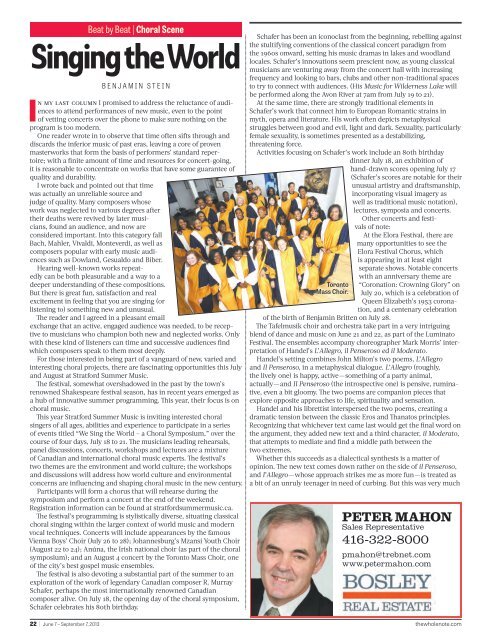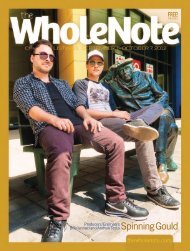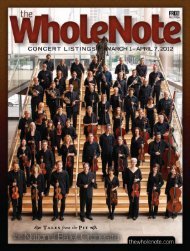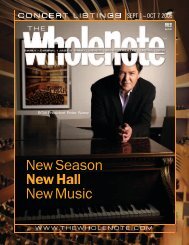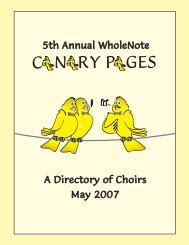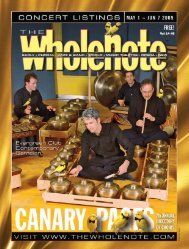Create successful ePaper yourself
Turn your PDF publications into a flip-book with our unique Google optimized e-Paper software.
Beat by Beat | Choral SceneSinging the WorldBenjamin SteinIn my last column I promised to address the reluctance of audiencesto attend performances of new music, even to the pointof vetting concerts over the phone to make sure nothing on theprogram is too modern.One reader wrote in to observe that time often sifts through anddiscards the inferior music of past eras, leaving a core of provenmasterworks that form the basis of performers’ standard repertoire;with a finite amount of time and resources for concert-going,it is reasonable to concentrate on works that have some guarantee ofquality and durability.I wrote back and pointed out that timewas actually an unreliable source andjudge of quality. Many composers whosework was neglected to various degrees aftertheir deaths were revived by later musicians,found an audience, and now areconsidered important. Into this category fallBach, Mahler, Vivaldi, Monteverdi, as well ascomposers popular with early music audiencessuch as Dowland, Gesualdo and Biber.Hearing well-known works repeatedlycan be both pleasurable and a way to adeeper understanding of these compositions.But there is great fun, satisfaction and realexcitement in feeling that you are singing (orlistening to) something new and unusual.<strong>The</strong> reader and I agreed in a pleasant emailexchange that an active, engaged audience was needed, to be receptiveto musicians who champion both new and neglected works. Onlywith these kind of listeners can time and successive audiences findwhich composers speak to them most deeply.For those interested in being part of a vanguard of new, varied andinteresting choral projects, there are fascinating opportunities this Julyand August at Stratford Summer Music.<strong>The</strong> festival, somewhat overshadowed in the past by the town’srenowned Shakespeare festival season, has in recent years emerged asa hub of innovative summer programming. This year, their focus is onchoral music.This year Stratford Summer Music is inviting interested choralsingers of all ages, abilities and experience to participate in a seriesof events titled “We Sing the World – a Choral Symposium,” over thecourse of four days, July 18 to 21. <strong>The</strong> musicians leading rehearsals,panel discussions, concerts, workshops and lectures are a mixtureof Canadian and international choral music experts. <strong>The</strong> festival’stwo themes are the environment and world culture; the workshopsand discussions will address how world culture and environmentalconcerns are influencing and shaping choral music in the new century.Participants will form a chorus that will rehearse during thesymposium and perform a concert at the end of the weekend.Registration information can be found at stratfordsummermusic.ca.<strong>The</strong> festival’s programming is stylistically diverse, situating classicalchoral singing within the larger context of world music and modernvocal techniques. Concerts will include appearances by the famousVienna Boys’ Choir (July 26 to 28); Johannesburg’s Mzansi Youth Choir(August 22 to 24); Anúna, the Irish national choir (as part of the choralsymposium); and an August 4 concert by the Toronto Mass Choir, oneof the city’s best gospel music ensembles.<strong>The</strong> festival is also devoting a substantial part of the summer to anexploration of the work of legendary Canadian composer R. MurraySchafer, perhaps the most internationally renowned Canadiancomposer alive. On July 18, the opening day of the choral symposium,Schafer celebrates his 80th birthday.Schafer has been an iconoclast from the beginning, rebelling againstthe stultifying conventions of the classical concert paradigm fromthe 1960s onward, setting his music dramas in lakes and woodlandlocales. Schafer’s innovations seem prescient now, as young classicalmusicians are venturing away from the concert hall with increasingfrequency and looking to bars, clubs and other non-traditional spacesto try to connect with audiences. (His Music for Wilderness Lake willbe performed along the Avon River at 7am from July 19 to 21).At the same time, there are strongly traditional elements inSchafer’s work that connect him to European Romantic strains inmyth, opera and literature. His work often depicts metaphysicalstruggles between good and evil, light and dark. Sexuality, particularlyfemale sexuality, is sometimes presented as a destabilizing,threatening force.Activities focusing on Schafer’s work include an 80th birthdaydinner July 18, an exhibition ofhand-drawn scores opening July 17(Schafer’s scores are notable for theirunusual artistry and draftsmanship,incorporating visual imagery aswell as traditional music notation),lectures, symposia and concerts.Other concerts and festivalsof note:At the Elora Festival, there aremany opportunities to see theElora Festival Chorus, whichis appearing in at least eightseparate shows. Notable concertsTorontoMass Choir.with an anniversary theme are“Coronation: Crowning Glory” onJuly 20, which is a celebration ofQueen Elizabeth’s 1953 coronation,and a centenary celebrationof the birth of Benjamin Britten on July 28.<strong>The</strong> Tafelmusik choir and orchestra take part in a very intriguingblend of dance and music on June 21 and 22, as part of the LuminatoFestival. <strong>The</strong> ensembles accompany choreographer Mark Morris’ interpretationof Handel’s L’Allegro, il Penseroso ed il Moderato.Handel’s setting combines John Milton’s two poems, L’Allegroand Il Penseroso, in a metaphysical dialogue. L’Allegro (roughly,the lively one) is happy, active — something of a party animal,actually — and Il Penseroso (the introspective one) is pensive, ruminative,even a bit gloomy. <strong>The</strong> two poems are companion pieces thatexplore opposite approaches to life, spirituality and sensation.Handel and his librettist interspersed the two poems, creating adramatic tension between the classic Eros and Thanatos principles.Recognizing that whichever text came last would get the final word onthe argument, they added new text and a third character, il Moderato,that attempts to mediate and find a middle path between thetwo extremes.Whether this succeeds as a dialectical synthesis is a matter ofopinion. <strong>The</strong> new text comes down rather on the side of il Penseroso,and l’Allegro — whose approach strikes me as more fun — is treated asa bit of an unruly teenager in need of curbing. But this was very muchPETER MAHONSales Representative416-322-8000pmahon@trebnet.comwww.petermahon.com22 | June 7 – September 7, 2013 thewholenote.com


